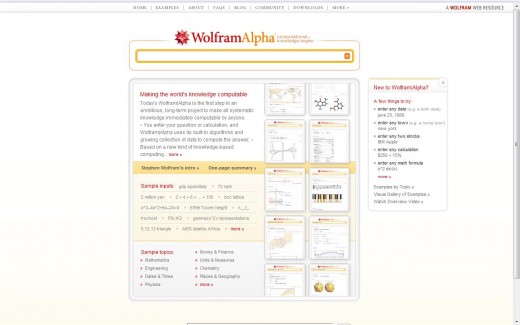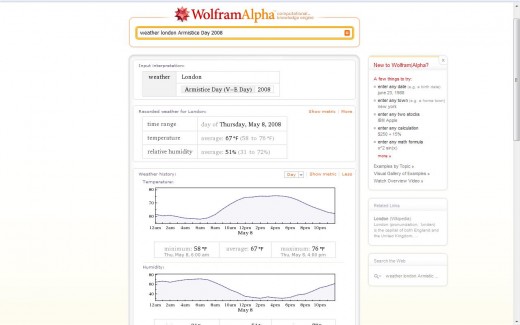Wolfram Alpha
Introduction
Wolfram Alpha is a new search engine which it has been predicted has the potential to be better than Google. At present only a few individuals are able to use the search engine, but it will be released for use by the general public sometime in May 2009. This is my page which gives a background to the project, and once I have been able to use the search engine I will give my own review.
A brief background
Wolfram Alpha is a search engine under development by Stephen Wolfram. He is a famous scientist who had a PhD in theoretical physics, having previously attended Eton School and Oxford University in the UK. Before starting work on the Wolfram Alpha search engine he had written many journal articles on particle physics and published the book A New Kind of Science. Most relevent to the Wolfram Alpha, he had written the computer program Mathmatica which is used by scientists worldwide for computation. The Mathmatica program has been developed by Wolfram Research, a company in which Stephen Wolfram has a majority stake, and this is the same company to have developed the Wolfram Alpha search engine.


How does Wolfram Alpha work?
The Wolfram Alpha website is based on natural language processing. This means that when searches are carried out Wolfram Alpha will first try and determine exactly what the search is asking. Once Wolfram Alpha has has determined this it will then calculate which is the best response - so called computational programming. As such the Wolfram Alpha system will hopefully give a response that first understands the question being asked in terms of the human language, and then will be able to give the best result based on carrying out this natural language checking of the available datasets and give a response, as shown by the video below.
If Wolfram Alpha is able to answer the request, it will display the answer within the webpage itself, along with associated information (see picture below). At the present time the program is very much science and mathematics based due to this being where the bulk of the information used is located. For example, whilst it is able to give an answer for the weather in London on Armistice Day 2008, it is not able to give answers for searches alluding to the latest celebrity gossip or other non science based queries such as the search term 'Bristol Balloon Fiesta'.

How do conventional search engines work?
The is different to the way Google and other search engines work.
These existing search engines contain millions or billions of webpages
on their servers, and then every time a search is performed estimate
which page meets the search best based on amongst other things the
matching of the search term to the article. Whilst it has changed
slightly from this, with Google's Pagerank giving a greater emphasis to
more reliable/better perceived websites, the basic principle remains - the search engine uses a lookup program. As such, were a question to be asked in a conventional search engine, there is a chance that a page will be returned as a suitable result, just because it is on a trusted website (eg CNN or the BBC) and has the search for words somewhere on the page. In fact the article may not even be about the search query, but happens to contain all of the desired words from the original search.
My thoughts
Whilst I am yet to try out the idea so far I am encouraged by the reviews it has been getting so far. For example, the well respected programming expert Nova Spivack has said that it 'Could be as important as Google'. Whilst I am personally not getting caught up in all the hype, I am desperate to try it out, and will change the review on this page accordingly when I do.
Further Information
- Wolfram|Alpha
This is the homepage of Wolfram Alpha. - Wolfram Blog : Wolfram|Alpha Is Coming!
Stephen Wolfram's blog. - Wolfram Alpha is Coming -- and It Could be as Important as Google | Twine
The review of the Wolfram Alpha by Nova Spivack. - Guardian Article
This is an article which appeared in the UK newspaper the Guardian on the Wolfram Alpha search engine.









